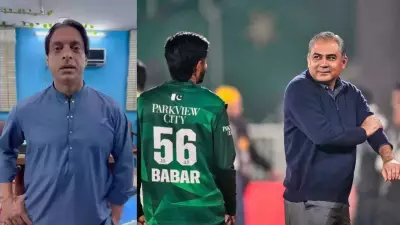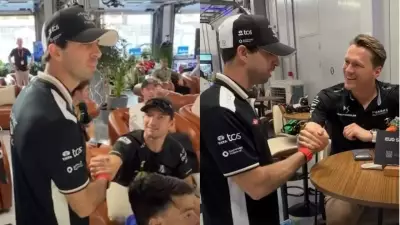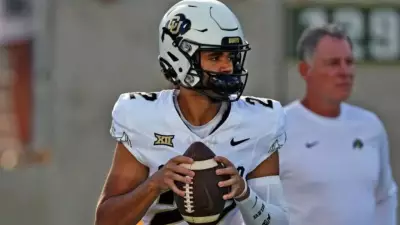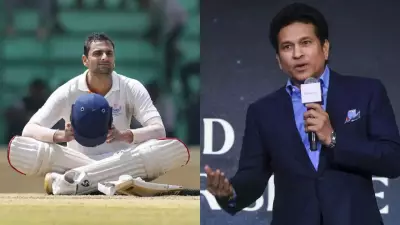
The Tiny Nation That's Shaking World Football
In what could become one of the greatest underdog stories in football history, the Faroe Islands - with a population of merely 55,000 people - stands on the brink of achieving the impossible. This remote archipelago, smaller than most Indian cities, has defied all expectations to remain in contention for qualification to the 2026 FIFA World Cup.
The team, currently ranked 127th globally by FIFA and featuring part-time players including a furniture salesman, teacher, and carpenter, finds itself in unprecedented territory. Despite the overwhelming odds, they've managed to position themselves for a potential playoff spot that could lead to their first-ever major tournament appearance.
Against All Odds: The Faroese Spirit
Coach Eydun Klakstein, who interestingly moonlights as a crime novelist, has been instrumental in crafting this remarkable campaign. In his inspiring letter titled "Against the wind, against the odds," he captured the essence of Faroese resilience: "We are Faroese. Shaped by the wind. Beaten by the storms. Softened by the rain. We do not back down from great challenges or adversity."
Klakstein's philosophy has transformed the team's approach. "Sometimes people say that we Faroese should be realistic about our size and our possibilities," he acknowledged. "But if we ourselves had thought like that we would never have had the strong society we have here in the Atlantic Ocean. We would not have our language, our culture, our land."
The statistics underline just how extraordinary this campaign has been. The Faroe Islands currently sit third in their qualifying group, just four points behind powerhouse Croatia and only one point behind the Czech Republic with one match remaining. Their recent form has been spectacular, with four wins from their last five games, including a stunning 2-1 victory over the Czech Republic last month.
The Road to Improvement
This success didn't happen overnight. The transformation represents years of strategic development in Faroese football. Christina Ravnsfjall, grassroots coordinator for the Faroe Islands Football Federation, explained the journey: "We are a very volunteer-based football society. All coaches of children are often parents who have been playing football and they just started with nothing."
The federation has focused on improving coaching standards and youth development, taking inspiration from Belgium's approach to nurturing talent. "They're not a big country but they're considered good. They have top players," Ravnsfjall noted about their Belgian inspiration.
Infrastructure improvements have also played a crucial role. The construction of tunnels connecting major islands has eliminated the need for time-consuming ferry journeys, while the abundance of football pitches - "every village has a football pitch" according to Ravnsfjall - ensures widespread access to training facilities.
The national stadium in Torshavn, with its 6,000 seats, has become a fortress where even top teams struggle. Croatia managed only a narrow 1-0 win there in September, while Montenegro suffered a comprehensive 4-0 defeat last month.
The Final Challenge: Croatia Awaits
The Faroe Islands face their toughest test yet when they travel to play Croatia on Friday. The 2018 World Cup finalists, led by Ballon d'Or winner Luka Modric, present a formidable obstacle. Even with a victory, the Faroe Islands would need other results to go their way, specifically needing to better the Czech Republic's result against Gibraltar.
Eli Hentze, former assistant for the national team, put the potential achievement in perspective: "I understand people from the outside, looking in at such a small country, asking the question, 'How on earth is that kind of possible?' But our players, our coaches are so used to facing far, far, far stronger opposition."
Hentze emphasized the team's unique mentality: "That bravery, courage, and believing in ourselves, punching above our weight, is ingrained in the way we are... the team is confident that they can do something and that tells us a story that they have a belief which is not something that the brain has told us, but something coming from the heart."
A victory against Croatia would represent what Hentze called "one of the biggest results ever" in football history. Yet the Faroese fans remain characteristically unfazed by reputations. "They just say go out and beat them," Hentze revealed. "They don't care about if we are inferior, just go out and win."
Regardless of the final outcome, the Faroe Islands have already written one of the most inspiring chapters in recent football history, proving that heart and determination can sometimes overcome even the most daunting statistical disadvantages.






